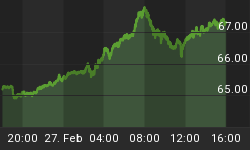As it applies to investing, is it true that "what has gone up must come down?" And also, what has gone down must come up?
If it is, investing might be a lot simpler. Just identify those stocks, funds, ETFs, etc. that are up "too much" over a long stretch and avoid them. Instead invest elsewhere, such as in investments that may have gone up but not what appears to be way out of proportion to the rest of the market, or perhaps even better, in those that appear to have been excessively beaten down.
The above statements, if true, suggest that the best performing investments right now will likely fall back to earth, sooner rather than later, while the poor performing ones (but still with excellent attributes) should be able to eventually recapture the spotlight.
Recently, in response to my April 29th SafeHaven article also published on seekingalpha.com, a site where sophisticated investors like to read articles about out how to perhaps outperform, but also to comment on articles such as mine that try to help investors do just that, I received the following feedback and question:
Tom,
You seem to be assuming that most of aggregate differences in growth are due to investor sentiment, thus by your measure of under/over valued what has gone up, must come down (or vice versa).
But there are intrinsic forces in the world that will systematically affect an entire sector, thus fast or slow grow would not represent under or over valuing. Indeed if that factor continued to hold, then it would predict the opposite of what you recommend.
So have you done any systematic backtesting of your theories, over a large range of funds? It should be pretty easy to do. Does it pan out when assessed systematically?
Thanks,
Dan
In fact, the article "With The Market Overpriced, Here's What To Do" has thus far received 102 comments on seekingalpha. But with so many comments, most of its readers won't ever see my response. Since my response not only offers one viewpoint to try to answer the above perhaps impossible to totally resolve question, as well as data showing the effectiveness of constructing portfolios that often follow just such an approach, I am presenting it for readers below:
Hello Dan - thank you for your interesting and thought provoking comments.
While it might appear that my approach is "what has gone up, must come down (or vice versa)," it is actually far more complicated than that.
I have always felt that a given sector within the market can remain either over- or under-valued for years on end. Thus, I do acknowledge that either economic factors or sentiment can continue to drive certain stock prices in the same direction rather than reversing as my approach might suggest.
Yes, I agree that intrinsic forces in the world such as either fast or slow growth can continue to operate in either apparently favorable or unfavorable ways, for a given sector. But growth is not always synonymous with great stock returns. For example, while health care stocks can show better growth than other sectors, that does not mean that funds investing in health care will continue to do better than most sectors. I do believe that at some point, overvaluation sets in and serves to increase the odds of lesser returns.
To continue the example, Vanguard Health Care Fund currently has a P/E ratio of 38. I would think that anyone with a knowledge of past P/E ratios would agree that this is a serious warning signal - not that the fund will necessarily crash immediately - but that based on an historical perspective, you could easily be better off investing in a fund with a lower P/E. Such a measure of overvaluation (which highly overlaps with my own 15+% for 5+ years "yardstick"), can't closely predict future returns but it certainly increases the odds of trouble ahead.
Another factor to consider is that the economy tends to run in cycles of up periods followed by down periods. Often the up cycles tend to run in the general neighborhood of about 5 years. Since we have now surpassed that average length, we are "overdue" for a down cycle. And when a down cycle begins, funds that have gone up the most tend to correct the most.
But, while my words may not be enough to convince someone of what I am saying, I offer the following evidence that my approach works:
Had one invested in my 2000, 2003, 2006, 2009, and 2012 Model Stock Portfolios and held them for the 3 following years, one would have outperformed a portfolio of low cost index funds by an amount approaching 3% per year. This, I would argue, is a record that would have been hard to beat by merely trying to figure out the fund sectors with the current fastest growth.
Getting an outperformance of this magnitude for a period encompassing the last 15 years strongly suggests that holding a portfolio consisting of undervalued and well selected funds, while avoiding overvalued ones, over periods of three to as many as 5 years, can produce considerably superior results for investors. Of course, other factors may suggest portfolio changes "midstream" which might improve performance even more.















